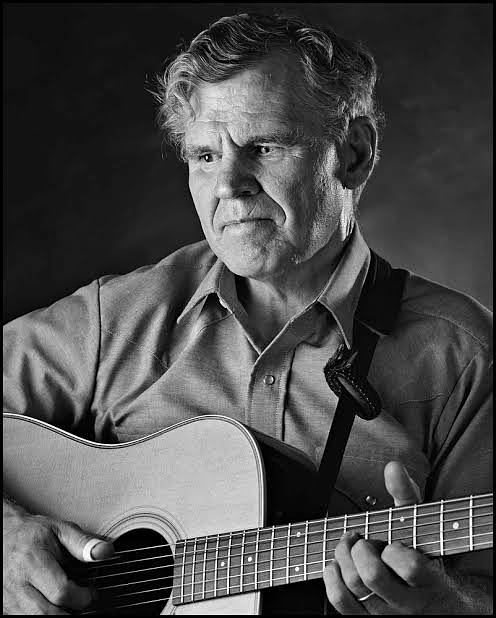I Have Heard Doc Watson

I love history. In my imagination, I’ve watched Alexander lead
armies. I’ve stared at Hemingway standing at his office desk over the
garage at his Key West home. I can stand in front of the Lincoln
Memorial and hear Dr. King’s voice. I love history.
The Blind Flat Picker
Only once in my life have I witnessed history. I’ve seen one of
America’s musical wonders in concert. His name is Doc Watson. One day
I’ll tell my grandchildren that I saw him play. I’ll tell them how out
of the mountains of Western North Carolina came a blind guitar picker
who could stop a riot by playing a couple of choruses of Black
Mountain Rag.
Before Doc became a living legend, he was just a blind man trying to
support his family as a full-time piano tuner and occasional musician.
For twenty years he played with local N.C. bands. Playing country,
rock-a-billy, and a variety of other popular songs, He played what the
people of Morganton, Lenoir, Hickory and Asheville wanted to hear. He
didn’t play traditional music in public until, encouraged by music
historian Ralph Rinzler, he accepted an engagement in a Greenwich
Village folk club in 1961. Watson gained national attention at the
legendary Newport Folk Festivals of 1963 and 64. The lasting record that
we have of those concerts is The Essential Doc Watson,
available as one CD since 1986. It was originally released as two
separate vinyl LPs.
Supporting Cast
Of the 26 songs in this collection, Watson performs as an unaccompanied
flat-picking guitarist on 17 of them. On the remaining tunes members of
his family accompany him. His then teenage son Merle (named after Merle
Travis) plays second guitar on The Train That Carried my Girl From
Town and Blackberry Blossom.
Watson’s father-in-law, legendary fiddle player Gaither Carlton appears
on Blueridge Mountain Blues, Handsome Molly, and the Woodie
Guthrie composition Going Down this Road Feeling Bad.
Doc’s brother, Arnold, plays banjo on three tunes, including
Whitehouse Blues. And, Doc’s mother even joins in on the vocals
on the traditional spiritual I Want to Love Him More.
Song Writing Credits
Only eight of the songs on the album are credited to other artists. The
traditional songs arranged and adapted by Doc Watson are:
- Tom Dooley
- Alberta
- Beaumont Rag
- Muskrat
- Down in the Valley to Pray
- Shady Grove
- Black Mountain Rag
- Groundhog
- Little Orphan Girl
- Rambling Hobo
- Little Omie Wise
- Handsome Molly
- I Want to Love Him More
- Way Downtown
There are two songs by the Singing Brakeman, Little Jimmy Rodgers:
- My Rough and Rowdy Ways
- I Was a Stranger
Other credits not already mentioned are:
- James Baker – Saint James Hospital
- Alton Delmore – Blue Railroad train
- Clarence Ashley – Rising Sun Blues
- Charlie Poole – Whitehouse Blues
The Music
Most of these songs are short, many of the coming in at under two
minutes. Only Froggie Went A-Courtin’, Rising Sun Blues and
Little Omie Wise are longer than four minutes.
The themes of these folk and bluegrass tunes are those of the mountains
from whence Doc Watson came. Murderous lovers are found in Tom
Dooley and Little Omie Wise. At least three tunes contain
references to trains. There are traditional blues and flat-picking
marvels like the Beaumont Rag and the Black Mountain
Rag. There are spirituals and children’s songs.
I play this album compulsively over and over again. I know every chorus.
When I hear a version of one of these songs by another artist it somehow
seems profane, like looking at a paint-by-number version of a Van
Gogh.
This is a historical collection of music and I love history.
